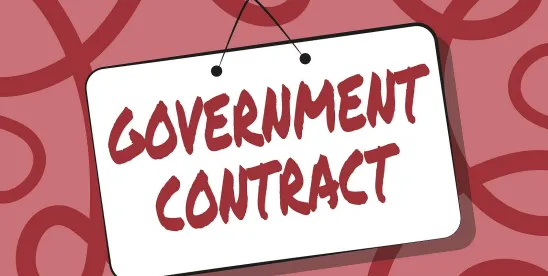In the four weeks since President Trump issued Executive Order (“EO”) 14151 (“Ending Radical and Wasteful Government DEI Programs and Preferencing”) and EO 14173 (“Ending Illegal Discrimination and Restoring Merit-Based Opportunity”), virtually all sectors of American society have been scrambling to understand their compliance obligations and seeking to reduce legal risk. Businesses have taken a range of approaches, from preparing to defend their diversity, equity, and inclusion (“DEI”) commitments to removing public-facing references to DEI. Some government contractors have received DEI-related certifications required by EO 14173, which implicate enforcement under the False Claims Act (“FCA”).
In a significant new development, on February 21, 2025, the United States District Court for the District of Maryland issued a nationwide preliminary injunction against both EO 14151 and EO 14173. Here’s what federal contractors need to know.
Case Background
The plaintiffs allege that EO 14151 violates the Constitution’s spending clause by directing the termination of “equity-related” contracts (Count I); that Sec. 2 of EO 14151 and Sec. 4 of EO 14173 are unconstitutionally vague (Counts II and III); that Sections 3 and 4 of EO 14173 violate the First Amendment’s Free Speech Clause (Counts IV and V, ); and that EO 14173 violates the constitutional separation of powers principle (Count VI).
The Challenged Provisions
The Court generally describes the EOs’ “Challenged Provisions” as follows:
- The “Termination Provision” of EO 14151 directs executive agencies to terminate “equity-related” grants and contracts;
- The “Certification Provision” of EO 14173 directs executive agencies to require a new contract certification, enforceable through the FCA, stating that the contractor does not promotea DEIprogram that violates applicable federal anti-discrimination laws; and
- The “Enforcement Threat Provision” of EO 14173 directs the Attorney General (“AG”) to encourage the private sector to end illegal discrimination and preferences, including DEI, and to have agencies identify up to nine targets for potential civil compliance investigations.
The following analysis focuses on the Certification and the Enforcement Threat challenges, which are the most salient for government contractors.
1. Likelihood of Success on the Merits
The Court found that Plaintiffs showed injury from the Certification and Enforcement Threat Provisions because Plaintiffs “reasonably expect that they will be forced to either restrict their legal activities and expression that are arguably related to DEI, or forgo federal funding altogether.” (Memorandum of Opinion (“Mem. of Op.”) at 25.)
(a) First Amendment Rights of Contractors
The Court specifically addressed the First Amendment rights of federal contractors, reiterating that in Board of Cnty. Com’rs, Wabaunsee Cnty., Kan. v. Umbehr the Supreme Court held that the government does not have “carte blanche to terminate independent contractors for exercising First Amendment rights.” 518 U.S. 668, 679 (1996). Although the government has some ability to restrict a government contractor’s free speech rights, Fulton v. City of Philadelphia, Pennsylvania, 593 U.S. 522, 535 (2021), the First Amendment prohibits the government from “seek[ing] to leverage funding to regulate speech outside the contours of the program itself.” Agency for Int’l Dev. v. All. for Open Soc’y Int’l, Inc., 570 U.S. 205, 214-15 (2013) (“AID”). Additionally, the government may not terminate government contracts “because of the[] [contractors’ or grantees’] speech on matters of public concern.” Wabaunsee County, 518 U.S. at 675.
The Court also found Plaintiffs are likely to succeed because the Certification “constitutes a content-based restriction on the speech rights of federal contractors…” and applies to all of a contractor’s work, whether or not funded by the government. (Mem. of Op. at 25.)
The Court noted that during the hearing, the government failed to satisfactorily address hypotheticals about DEI implementation by federal contractors and thus, “[b]ecause even the government does not know what constitutes DEI-related speech that violates federal anti-discrimination laws, Plaintiffs have easily shown a likelihood that they will prevail in proving that the Certification Provision operates as a content-based prior restraint on their speech, and likely will also prevail in showing that the Certification operates as a facially viewpoint-discriminatory order as well. The speech-chilling effect of the Certification Provision is particularly obvious given the vagueness of the [EOs]…”, and that “federal contractors… have shown they are unable to know which of their DEI programs (if any) violate federal anti-discrimination laws, and are highly likely to chill their own speech—to self-censor, and reasonably so—because of the Certification Provision. Indeed, the Certification Provision was likely designed to induce, and certainly has been shown to have the effect of inducing, federal contractors… to apply an overinclusive definition of illegal DEI to avoid risking liability. This is exactly what AID prohibits…” (Mem. of Op. at 47.)
(b) The FCA
The Court also addressed the precarious situation of contractors facing the Certification Requirement, noting that the vagueness of EO 14173 puts them “in a position to have to guess whether they are in compliance” and that they are “threatened with False Claims Act liability if they miss the mark. Such escalation of consequences dramatically raises the stakes, and by extension dramatically expands the degree of injury to interests protected by the Fifth Amendment.” (Mem. of Op. at 54-55.)
2. Irreparable Harm
The Court found that Plaintiffs are suffering irreparable harm due to a chilling effect on their speech and a potential loss of federal funding. The Court noted: “…the Challenged Provisions strip Plaintiffs of the ability to know what the government might now consider lawful or unlawful. There have been 60 years of statutes, regulations, and case law developed since the Civil Rights Act of 1964. The Challenged Provisions strip away much of the prior executive branch guidance, and then threaten the loss or condition the receipt of federal funds, and also threaten civil enforcement actions—some backed by the possibility of treble damages—for violations. And in so doing, they threaten to punish prior expressions of protected speech, and chill future expressions of protected speech.” (Mem. of Op. at 56-57.)
3. Balance of the Equities
Here, the Court approvingly cited the Plaintiffs’ statement that “[e]fforts to foster inclusion have been widespread and uncontroversially legal for decades” (Mem. of Op. at 59), and stated that the “the status quo must be maintained while Plaintiffs and the government litigate the claims asserted in this case. The balance of equities tips strongly in Plaintiffs’ favor.” (Mem. of Op. at 60.)
Implications for Federal Government Contractors
The injunction has several immediate implications for federal government contractors:
1. Contractors no longer face the immediate threat of termination due to undefined “equity-related” activities.
2. Agencies cannot require contractors to make certifications pursuant to the Certification Provision.
3. The government may not bring an FCA suit or other enforcement action based on the Enforcement Threat Provision, temporarily reducing the risk of government-initiated FCA action.
4. The injunction does not apply to the requirement under EO 14173 that the AG submit a report in coordination with the heads of relevant agencies that identifies key sectors of concern within each agency’s jurisdiction, and each sector’s “most egregious DEI practitioners,” as well as up to nine targets for potential civil compliance investigations. We therefore expect the AG to continue preparing this report—which is what was prompting some contractors to reconsider the extent of their public commitments to DEI in the first place. The AG’s report is due May 21, 2025.
Moving Forward
Contractors should consider the following steps in light of the injunction:
- Document DEI-Related Interactions with the Government: Contractors should document any communications or actions taken by federal agencies that might contravene the injunction.
- Stay Informed: Monitor further legal developments, both in this case and in a similar one filed February 19, 2025, in the United States District Court for the District of Columbia.
- Consult Legal Counsel: Contractors should consult counsel regarding existing DEI programs, including whether and how to amend such programs given the changing legal landscape.
Conclusion
The preliminary injunction is an initial victory for federal contractors that provides immediate relief from the threat of losing federal funding for not signing a DEI certification, the threat of government-initiated FCA enforcement, and the infringement on DEI-related speech.



 />i
/>i

